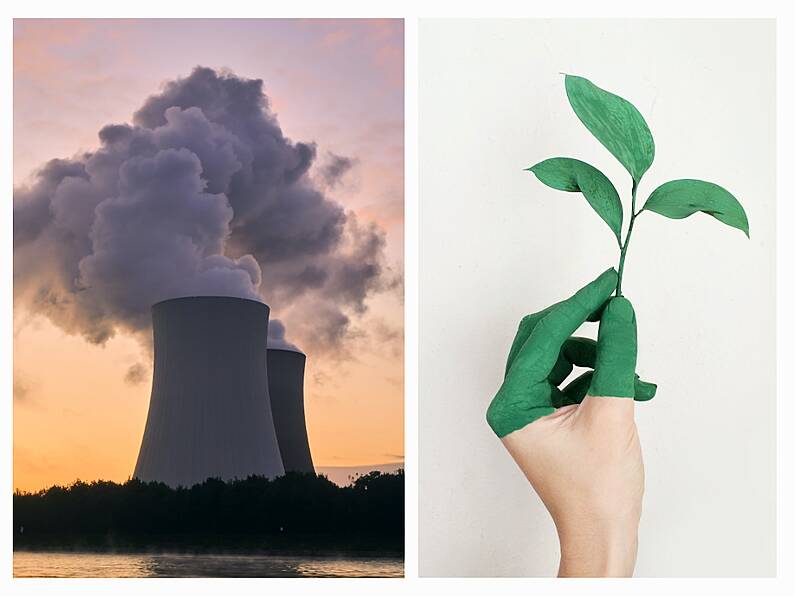The EU is setting out to ban terms like "climate neutral" and "climate positive" without any evidence to support the claims.
Orla finds out more about the new legislation against "greenwashing" and how we can be more aware of it in our everyday lives.
What is Greenwashing?
Greenwashing is the deceptive tactics behind environmental claims.
Greenwashing presents a significant obstacle to tackling climate change. By misleading the public to believe that a company or other entity is doing more to protect the environment than it is, greenwashing promotes false solutions to the climate crisis that distract from and delay concrete and credible action.
Examples of Greenwashing
Greenwashing manifests itself in several ways – some more obvious than others.
Tactics include:
- Claiming to be on track to reduce a company’s polluting emissions to net zero when no credible plan is actually in place.
- Being purposely vague or non-specific about a company’s operations or materials used.
- Applying intentionally misleading labels such as “green” or “eco-friendly,” which do not have standard definitions and can be easily misinterpreted.
- Implying that a minor improvement has a major impact or promoting a product that meets the minimum regulatory requirements as if it is significantly better than the standard.
- Emphasizing a single environmental attribute while ignoring other impacts.
- Claiming to avoid illegal or non-standard practices that are irrelevant to a product.
Communicating the sustainability attributes of a product in isolation of brand activities (and vice versa) – e.g. a garment made from recycled materials that is produced in a high-emitting factory that pollutes the air and nearby waterways.
Why care about greenwashing, and how does it relate to climate change?
The science is clear: greenhouse gas emissions, such as carbon and methane, from human activities are wrapping the Earth in a blanket of pollution that has warmed the planet and led to severe impacts such as more intense storms, droughts, floods and wildfires.
To limit climate change and preserve a livable planet, emissions need to be cut nearly in half by 2030 and reduced to net zero by 2050. Every fraction of a degree of warming matters and, as put by the former chair of the High-Level Expert Group on the Net-Zero Emissions Commitments of Non-State Entities, “the planet cannot afford delays, excuses, or more greenwashing”.
Greenwashing undermines credible efforts to reduce emissions and address the climate crisis. Through deceptive marketing and false claims of sustainability, greenwashing misleads consumers, investors, and the public, hampering the trust, ambition, and action needed to bring about global change and secure a sustainable planet.
Why has the EU set out to ban it?
One 2020 EU Survey found that 42% of green claims on products were 'false and deceptive', and 53% of sustainability claims were 'vague, misleading and unfounded. ' The new legislation is hoped to empower customers to make genuinely planet-friendly decisions while forcing big businesses to step up or pay up.
The aim of the new rules is to protect consumers from misleading practices and help them make better purchasing choices.
What will be banned?
Negotiators from Parliament and Council agreed to proscribe the following:
- generic environmental claims, e.g. “environmentally friendly”, “natural”, “biodegradable”, “climate neutral” or “eco”, without proof of recognised excellent environmental performance relevant to the claim;
- commercial communications about a good with a feature that limits its durability if information is available on the feature and its effects on the durability;
- claims based on emissions offsetting schemes that a product has neutral, reduced or positive impact on the environment;
- sustainability labels not based on approved certification schemes or established by public authorities;
- durability claims in terms of usage time or intensity under normal conditions, if not proven;
- prompting the consumer to replace consumables, such as printer ink cartridges, earlier than strictly necessary;
- presenting software updates as necessary even if they only enhance functionality features;
- presenting goods as repairable when they are not.
When will it come into effect?
The Parliament and the Council will vote on bringing the proposals into law in November 2023 and EU member states will be given 24 months to enforce them. This means that if it all goes ahead, many forms of greenwashing will be banned in the EU by the end of 2026.
To find out more visit:
https://www.un.org/en/climatechange/science/climate-issues/greenwashing
https://www.europarl.europa.eu/news/en/press-room/20230918IPR05412/eu-to-ban-greenwashing-and-improve-consumer-information-on-product-durability
https://ecochain.com/blog/eu-law-will-ban-climate-neutral-claims-by-2026/
***
To listen back to our latest episode, click here.
To find out Your Carbon Footprint, visit footprintcalculator.org.
We'd also like to here your say on Climate Action by taking part in our survey.
Ours to Protect is funded by Coimisiún na Meán with the Television Licence Fee.
This project is a partnership between Beat 102 103 and the Independent Broadcasters of Ireland.
Check out Ours To Protect for more information.






